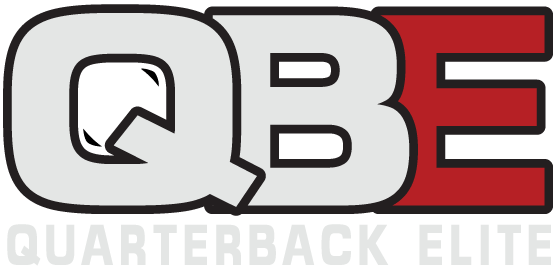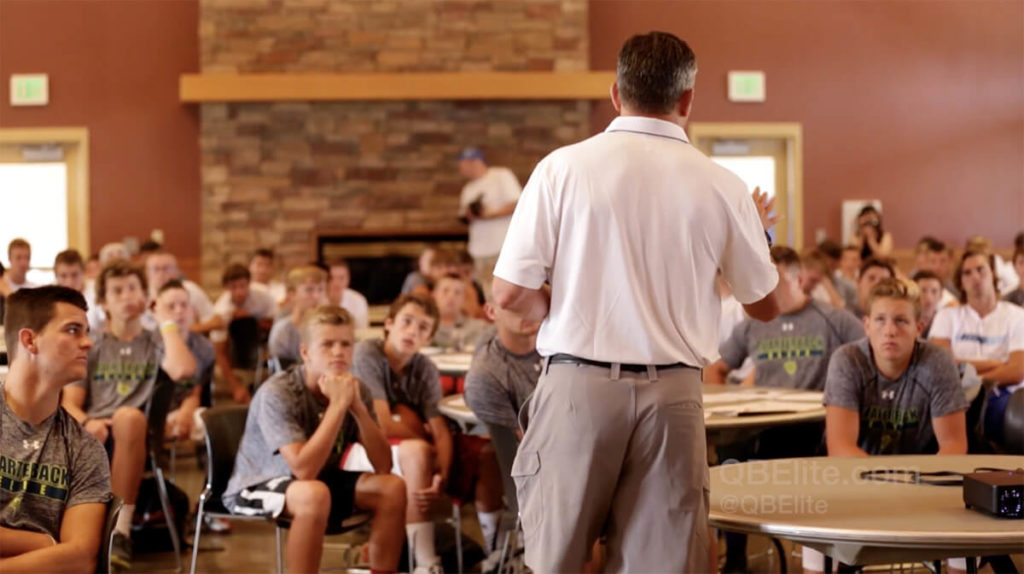Media
Deseret News: QB Elite offers life skills first, football advice second
Deseret News posted an article about QB Elite and our focus on offering life skills first and football advice second. Read the full article below.
American Fork quarterback Bronson Barron has been to a lot of football camps in his young life.
The standout junior has not, however, experienced the kind of camp he did this weekend as a participant of QB Elite.
“At camps, usually the focus is just on football,” he said. “Here, they really focus on mastering our craft, but more like what they said about outside of football and being the best you can be off the field.”
Coaches in all sports are fond of drawing real-life lessons from the games they teach. The games offer a unique situation where what a young person desires and what they need can be delivered in a format they embrace.
Several of the coaches at this weekend’s camp stood before the young men Friday night to introduce them to the idea of using their athletic success to become better human beings on and off the field.
One of the most powerful addresses came from former BYU quarterback Max Hall, who spoke candidly about his struggles with drug addiction. But that was sandwiched between energetic stories from Brandon Doman, who played quarterback at BYU and was Hall’s quarterback coach, and a passionate address from NFL veteran and three-time Pro-Bowler Mark Brunell.
Sure, Brunell told the boys, they were going to share what they knew about technique, studying and strategy. But he hoped they realized the talk about using the platform offered by athletic success as a way to help others wasn’t a side note. It was, coach after coach emphasized, the main message.
“What I appreciate about this camp is that we discuss things that have nothing to do with what we do and everything to do with who you are,” he said. “You’ve already experienced the most important part of this camp, and I really hope you took it to heart.”
He looked at his fellow coaches, sitting along the wall at the Lone Peak Park Pavilion. There was no doubt, he said, that if the boys paid attention, they’d leave better football players.
“But if you don’t leave here a better person,” he added, “then this was a colossal waste of time.”
This collection of talent is the first group of coaches to try convince those with talent that, despite their gifts, their athletic success didn’t have to be, even shouldn’t be, the high point of their lives.
To illustrate this point, Brunell offered two examples — Johnny Manziel and Tim Tebow.
Both were extremely successful college players, and both attracted a phenomenal amount of attention. The difference, Brunell said, is that Tebow had decided what kind of man he wanted to be, and that allowed him to remain true to himself, regardless of whether he was winning an NFL playoff game or being cut from a fourth NFL team in four years.
Manziel, on the other hand, didn’t have that same vision of the kind of man he wanted to be, and therefore he allowed the adoration, success and attention to distract and derail him. After being drafted No. 22 by the Cleveland Browns, bad behavior and a questionable work ethic stymied Manziel’s success.
Legal trouble, failed drug tests and punishments for unsportsmanlike behavior have marred what was once a promising NFL career.
Brunell pointed out that while Tebow’s football career is likely over, he will continue to bless the lives of people because of the life he committed to living long before he found fame. Just recently, a video went viral showing Tebow praying with a family while medical personnel treated a man who had collapsed on an airplane.
Manziel, on the other hand, Brunell said, will struggle and suffer because he made no kind of commitment about the kind of man he wanted to be.
When Brunell was drafted by the Green Bay Packers, he said his first coach told him that being a great quarterback came down to three things — decision-making, timing and accuracy.
“It’s the same in life,” he said. “It’s all about decision-making.”
Dustin Smith, co-founder of the camp, said the young men needed to take what they’d been blessed with and find ways to lift others. He pointed to recent statistics that showed Utah’s teen suicide rate has tripled in the last 10 years.
He encouraged them to pay attention to those who are struggling, hurting and relegated to the fringes of the high school universe. Reach out to them, help them, love them, Smith said. Use what he referred to as a “sportlight” to improve the lives of others.
Barron said it wasn’t just another series of pep-talks from coaches, some of them men he’d idolized all his life. He said the words moved him, and he hoped, changed him.
Sawyer Pierce, a senior quarterback at Olympus, felt the same way.
“Normally we don’t get this,” Pierce said. “We just go and throw the football around. It’s all about football. I loved how great they were at teaching football, but also about teaching other stuff, about how you can make yourself a better man by making better choices.”
Original Article Link: https://www.deseretnews.com/article/865657412/QB-Elite-offers-life-skills-first-football-advice-second.html

